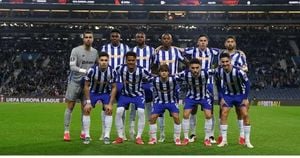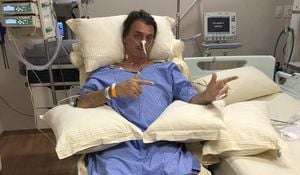Borussia Dortmund celebrated a remarkable victory on February 22, 2025, against Union Berlin, winning emphatically with a score of 6-0. The atmosphere was electric, with players, fans, and management alike sharing in the joy of this much-needed triumph. Led by standout performances, the team’s effort seemed like a collective breath of fresh air, something the club desperately needed amid recent struggles.
Following the match, the mood was overwhelmingly positive. BVB goalkeeper Gregor Kobel expressed his excitement on the pitch, and fans joined together to sing the BVB-Walzer, creating an uplifting atmosphere. The club’s executive leadership, including CEO Hans-Joachim Watzke, took to the dressing room to personally congratulate the players—a rare encounter for the often stress-stricken management team. Watzke’s visible delight as he applauded the win was indicative of the heavy weight lifted off the team’s shoulders after this stellar performance.
Serhou Guirassy emerged as the hero of the day by scoring four goals, supported by excellent contributions from Pascal Groß, who provided four assists, and the new addition Carney Chukuwuemeka, who impressed on his debut. Overall, the team functioned well together, showcasing the kind of synergy many had hoped to see. This victory marked Dortmund’s first home win of the 2025 Bundesliga season, propelling them up from their dismal tenth-place standing and offering hope for the rest of the campaign.
Despite the jubilant win, not all is well within Borussia Dortmund. The club has been experiencing significant internal challenges, drawing criticism from fans and analysts alike. Mental coach Matthias Herzog voiced his concerns over the direction the club is heading. He stated, "Die Probleme sind nicht neu – aber sie werden von Jahr zu Jahr größer. Wer beim BVB nach den Schuldigen sucht, muss ganz oben anfangen," emphasizing the need to critique the leadership above the players.
Herzog elaborated on his critique, labeling the club's top executives as aloof and reactive, likening them to competitors rather than responsible leaders. He remarked, "Der Fisch stinkt vom Kopf: Watzke, Ricken, Kehl, Sammer – die Dortmunder Chefetage wirkt wie ein Gockelstall," which translates to "The fish stinks from the head: Watzke, Ricken, Kehl, Sammer – the Dortmund management resembles a henhouse, with everyone thinking they are the most important, but no one taking true responsibility." This critique resonates with many supporters who have observed the repeated missteps of team management and coaching choices.
Recent months have also seen turbulence within the club’s technical directorate, highlighted by the fallout between Sports Director Sebastian Kehl and Technical Director Sven Mislintat, which became public knowledge. Herzog criticized these power struggles, stating, "Statt als Einheit voranzugehen, gibt es immer wieder interne Machtspielchen. Wer Führung von seinem Team erwartet, muss sie selbst vorleben," asserting the need for the management to function as a cohesive unit rather than engage in backroom challenges.
Echoing the sentiments of discontent, Herzog pointed out the detrimental impact these conflicts are having on the team’s performance on the pitch. He raised questions about the leadership style of head coach Niko Kovac, who was expected to bring stability and direction to the team. Instead, Herzog warns of the tendency to fall back on complacency, stating, "Regenerieren wovon? Vom Versagen?" which translates to "Regenerate from what? From failure?" This suggests the need for more rigorous standards for accountability and improvement.
It is clear from Herzog’s analysis and the responses of fans and pundits alike, Borussia Dortmund stands at a significant juncture. The potential of the team is well-documented, but the framework for success appears fractured amid internal squabbles and miscommunication. The question remains: can the management rally behind their coach and players to forge a clear path forward? It is evident the club must establish solid leadership both on and off the field if they wish to avoid languishing among mediocrity.
With the Champions League aspirations at stake, the coming months will be pivotal for Dortmund. The team needs decisive leadership, clarified objectives, and genuine accountability from all levels of management to maximize its potential and restore its standing within European football.



